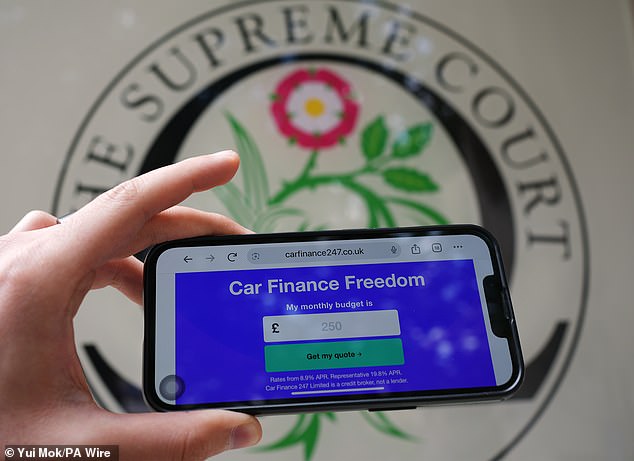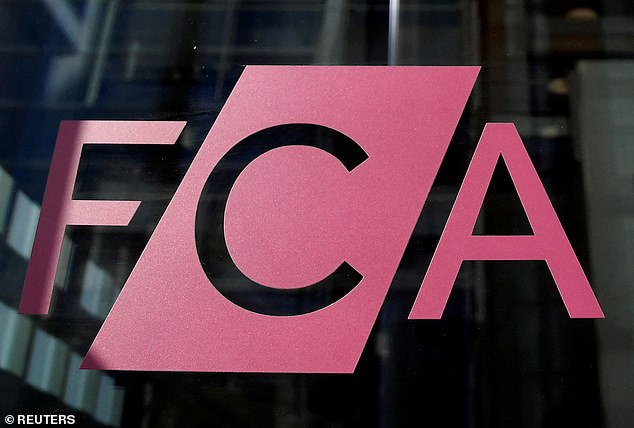- Some drivers could still receive payouts next year despite Supreme Court ruling
By ED MAGNUS
Updated:
Millions of drivers could still receive a pay out for ‘mis-sold’ car finance deals after the Financial Conduct Authority (FCA) said it is looking into a compensation scheme.
On Friday, the Supreme Court delivered a blow to car buyers after it sided with major lenders in the car finance scandal. Had the decision gone the other way, it could have led to £44billion of payouts dubbed ‘PPI on wheels’.
However, today, the FCA announced it will consult on an industry-wide redress scheme that could begin paying out from next year.
This could amount to about £950 per car buyer – with some who bought multiple cars able to claim more than once – and cost lenders between £9billion and £18billion.
The financial watchdog says it hopes the scheme will offer fairness and certainty to both customers and firms and in doing so, ensure the integrity of the car finance industry.
Millions of car owners have been hoping for payouts over claims they were ‘mis-sold’ finance deals dating back more than a decade.
Many car finance firms failed to comply with rules or the law, by not providing customers with relevant information about commission paid by lenders to the car dealers who sold the loans.
We explain what you need to know.

What did the FCA say?
‘It is clear that some firms have broken the law and our rules, said Nikhil Rathi, chief executive of the FCA, ‘it’s fair for their customers to be compensated.’
He added: ‘We also want to ensure that the market, relied on by millions each year, can continue to work well and consumers can get a fair deal.
‘Our aim is a compensation scheme that’s fair and easy to participate in, so there’s no need to use a claims management company or law firm. If you do, it will cost you a significant chunk of any money you get.
‘It will take time to establish a scheme but we hope to start getting people any money they are owed next year.’
Who will be entitled to compensation?
While some car finance customers won’t get compensation because in many cases commission payments were legal, the Supreme Court ruled that in certain circumstances the failure to properly disclose commission arrangements could be unfair and therefore unlawful.
The FCA will propose rules on how lenders should decide whether someone is owed compensation and how much. It says it will monitor if firms are following the rules and act if they’re not.
The Supreme Court agreed with several factors the FCA had identified which could point towards an unfair relationship and fall foul of the Consumer Credit Act (CCA).
Such factors could include the size of the commission relative to the loan charge, the nature of the commission, for example, whether it is discretionary and the characteristics of the customer.
How much compensation is due to car buyers?
The total cost of the compensation scheme is expected to rise above £9billion with the FCA estimating that most individuals will probably receive less than £950 in compensation.
The consultation will launch by early October. If the compensation scheme goes ahead, the first payments should be made in 2026.

What should you do if you think you are eligible?
People who have already complained don’t need to do anything, according to the FCA.
However, anyone who is concerned they were not told about commission and think they may have paid too much for their car finance lender should complain now.
There is no need to use a claims management company or law firm and doing so could cost someone around 30 per cent of any compensation paid.
The FCA recognises that car finance customers want to receive any compensation owed quickly while car finance firms, lenders and investors want certainty.
The regulator says it will be working hard over the coming weeks on the details of how a scheme would work.
What is the car finance scandal?
The majority of new cars and some second-hand cars are bought via car finance deals where drivers pay an upfront deposit, borrow the rest from a lender and pay back the loan each month with interest.
Each year some two million cars are purchased this way.
However, many dealers and brokers were paid a behind-the scenes commission by lenders for signing buyers up to these agreements, which some drivers claimed they did not know.
WHY WAS CAR FINANCE IN THE SUPREME COURT?
In October, a ruling by the Court of Appeal deemed that these ‘secret’ commission payments without a consumers fully informed consent were unlawful.
It considered the cases of three people with car finance deals, who argued they did not know about the commission made by their car dealers.
Some lenders challenged that Court of Appeal decision so the case went to the Supreme Court.
WHAT DID THE SUPREME COURT RULE?
It ruled in favour of lenders instead of millions of consumers. Car finance firms did not unlawfully sell products by failing to disclose commissions.
Supreme Court President Lord Reed said the court allowed the appeals brought by the finance companies.
It did uphold one claim that a customer’s relationship with the finance company was ‘unfair’ and that claimant will be awarded the amount of commission plus interest.
Lord Reed then said ‘other customers’ claims are rejected’.
It’s a blow for motorists who did not know about the commission payments involved in their car finance deals.
WILL ANYONE GET COMPENSATION?
The FCA is consulting on setting up a redress scheme for those unknowingly signed up to a discretionary commission agreement (DCA) when they took out their car loans.
In a DCA, lenders allow brokers and dealers to hike interest rates on car finance to increase their commission. These were banned in 2021 by the regulator. The watchdog has been probing DCAs since January 2024.
WHAT DOES THE FCA SAY?
The FCA says: Our detailed review of the past use of motor finance has shown that many firms were not complying with the law or our disclosure rules that were in force when they sold loans to consumers. Where consumers have lost out, they should be appropriately compensated in an orderly, consistent and efficient way.
Some consumers have challenged their agreements with lenders through the courts. On Friday the Supreme Court ruled that in many cases commission payments could be legal, but a lender did act unfairly – and therefore unlawfully – due in part to the size of the commission it paid to the motor dealer and how it was disclosed.
The Supreme Court agreed with several factors we had identified which could point towards an unfair relationship and fall foul of the Consumer Credit Act (CCA), whilst recognising it depends on the facts of each case.
Such factors could include:
- the size of the commission relative to the charge for credit
- the nature of the commission, for example, whether it is discretionary
- the characteristics of the consumer
- compliance with regulatory rules
- the extent and manner of disclosure
This clarity helps us because we have been looking at what is unfair and, prior to this judgment, there were different interpretations of the law coming from different courts.
We will now consult on a redress scheme. Redress would depend on non-disclosure of the factors above and the interaction between them.








